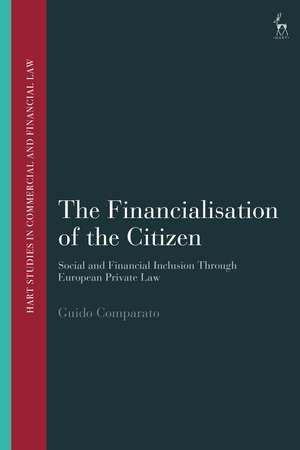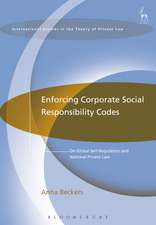The Financialisation of the Citizen: Social and Financial Inclusion through European Private Law: Hart Studies in Commercial and Financial Law
Autor Guido Comparatoen Limba Engleză Paperback – 25 noi 2020
| Toate formatele și edițiile | Preț | Express |
|---|---|---|
| Paperback (1) | 297.50 lei 6-8 săpt. | |
| Bloomsbury Publishing – 25 noi 2020 | 297.50 lei 6-8 săpt. | |
| Hardback (1) | 568.40 lei 6-8 săpt. | |
| Bloomsbury Publishing – 22 aug 2018 | 568.40 lei 6-8 săpt. |
Din seria Hart Studies in Commercial and Financial Law
- 30%
 Preț: 837.63 lei
Preț: 837.63 lei - 34%
 Preț: 539.78 lei
Preț: 539.78 lei - 18%
 Preț: 305.59 lei
Preț: 305.59 lei - 30%
 Preț: 512.04 lei
Preț: 512.04 lei - 34%
 Preț: 510.60 lei
Preț: 510.60 lei - 34%
 Preț: 512.30 lei
Preț: 512.30 lei - 22%
 Preț: 271.58 lei
Preț: 271.58 lei - 22%
 Preț: 264.10 lei
Preț: 264.10 lei - 18%
 Preț: 311.36 lei
Preț: 311.36 lei - 18%
 Preț: 321.78 lei
Preț: 321.78 lei - 18%
 Preț: 305.31 lei
Preț: 305.31 lei - 18%
 Preț: 304.29 lei
Preț: 304.29 lei - 18%
 Preț: 319.58 lei
Preț: 319.58 lei - 30%
 Preț: 511.57 lei
Preț: 511.57 lei - 30%
 Preț: 511.40 lei
Preț: 511.40 lei - 30%
 Preț: 511.64 lei
Preț: 511.64 lei - 30%
 Preț: 597.22 lei
Preț: 597.22 lei - 18%
 Preț: 633.92 lei
Preț: 633.92 lei -
 Preț: 374.08 lei
Preț: 374.08 lei
Preț: 297.50 lei
Preț vechi: 364.73 lei
-18% Nou
56.93€ • 59.71$ • 47.39£
Carte tipărită la comandă
Livrare economică 01-15 aprilie
Specificații
ISBN-10: 1509943781
Pagini: 232
Dimensiuni: 156 x 234 mm
Greutate: 0.33 kg
Editura: Bloomsbury Publishing
Colecția Hart Publishing
Seria Hart Studies in Commercial and Financial Law
Locul publicării:London, United Kingdom
Caracteristici
Notă biografică
Cuprins
Recenzii
Descriere
This book discusses the role of private law as an instrument to produce financial and social inclusion in a context characterised by the redefinition of the role of the State and by the financialisation of society. By depicting the political and economic developments behind the popular idea of financial inclusion, the book deconstructs that notion, illustrating the existence and interaction of different discourses surrounding it. The book further traces the evolution of inclusion, specifically in the European context, and thus moves on to analyse the legal rules which are most relevant for the purposes of bringing about the financialisation of the citizen. Hence, the author focuses more on four highly topical areas: access to a bank account, access to credit, over indebtedness, and financial education. Adopting a critical and inter-disciplinary approach, The Financialisation of the Citizen takes the reader through a top-down journey starting from the political economy of financialisation, to the law and policy of the European Union, and finally to more specific private law rules.












